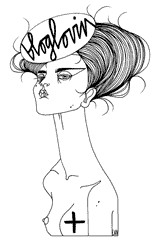How Fiction Works by James Wood
20 July, 2010
I wasn’t going to write about this book. Not because I didn’t like it, but because I felt that I couldn’t really discuss this properly without having read the novels James Wood discusses. Although I’ve been reading non-stop since I first strung letters together as a wee babe, I’ve never formally taken a literature or literary criticism course since I opted for science A-levels all those years ago. So I feel a tad underqualified to talk ‘literature’ as such. But then, I figured this is my blog and I’ll discuss what I like. And I liked this book so much that I would feel like a fraud if I didn’t talk about it and let you all know what I thought.
How Fiction Works by James Wood has been in the bookish news for a while since it was first published in 2008 causing a furore amongst critics, bloggers and authors. I was under the impression that most disliked it, some even hating it. So I was prepared to be offended. But he charmed me. There were little chapters, some just a paragraph long with one or two thoughts on the novel and reading. Others were more in-depth discussions of certain aspects of the novel with liberally dotted examples and quotations.
Wood is known for his aesthetic approach to the novel and is considered one of the foremost critics of modern literature. I haven’t read anything else by him, but having now read How Fiction Works, I’m interested in what he has to say about other works of fiction. What really made an impression on me was how much he loved the books he discussed and the playful nature of his discussion. It wasn’t dry, stuffy or difficult but did make you think about what you were reading. And that made me want to go out and read all of them: from Flaubert, who I tried several years ago and didn’t agree with much; to Proust, Joyce, Chekhov and Woolf, all of whom I’ve been meaning to read but still haven’t; some more Tolstoy; and Henry James, whom many consider one of the key American novelists of the 19th century. And more contemporary authors such as Bellow, Updike, Pyncheon and Roth. Maybe I should start compiling a list for next year, heh heh.
But what I would like to do is to revisit this book again once I’ve read more of the books he discusses so that I can really appreciate what he is trying to say about them. But don’t let this stop you from reading it, because if you like reading and are touched by the beauty of words, then I think you will enjoy it as much as I did. Plus it’s under 200 pages, always a bonus!
I’m curious to know what others think of How Fiction Works. Have you read it, and if so, did you like it?
For those of you who have read David Mitchell’s The Thousand Autumns of Jacob de Zoet, Wood has published a piece about it in The New Yorker.












20 July, 2010 at 4:38 pm
Sadly, I haven’t read this yet, but am quite intrigued to pick it up. And your listing of authors to be read was a delight to see — a list like that is a tough one to do, but I need to read them as well! Thanks for posting this, I agree that reading this compilation after reading those which he reviews would be even more interesting to absorb!
20 July, 2010 at 4:49 pm
I too chose science and math over literature courses through high school and university and often times feel under qualified, but hey, it’s our own spaces right?! I’m glad you chose to mention this book as your review makes me want to read it! I’m adding it to my wishlist.
21 July, 2010 at 12:47 am
Will be interesting to read this book but I am more taken by your comment about doing a list of the classics (like what you mention) both new and old. I think that would make a wonderful post!
21 July, 2010 at 3:05 am
after seeing Joyce and esp Woolf mentioned, i had to order it straight from amazon : ) together with Lahiri’s Unaccustomed Earth which was sitting in the cart for a long while, cos i didn’t trust myself making enough time for reading.
and what did the general opinions say, those who didn’t like the book?
21 July, 2010 at 6:33 am
I read a similarly titled book back in 2007 How Novels Work and really enjoyed it. 🙂
I’ve never taken a formal lit class (I was an international relations and modern languages double major), so I tend to avoid the formal analysis route on my blog. 😉
21 July, 2010 at 8:02 am
As someone who did pick those literature courses, I can tell you you’re really not underqualified. It’s mostly about practising close reading (which I know Amy and you do anyway) than about learning any special skills. Anyway, this sounds really interesting, although like you said I think I should probably read those classics he references first.
21 July, 2010 at 11:51 am
Natalie: It’s going to be a very long-term project, I think:) However, they are books that I’ve been meaning to read for a long time.
amymckie: It’s tempting to talk about things you are comfortable with on your blog, but I reckon it’s interesting to talk about things which you are unsure of as well. Plus it’s a book which I really liked and want others to read!
Mystica: Ha ha, we all love posts with lists, don’t we? Especially if they are of books!
itoeri: Ooh, enjoy! I think most of the critics just didn’t like his choices or his ideas about fiction. I can’t remember in detail, just that there was a lot of vitriol! Must go check out some other reviews.
Eva: I think if you are interested in reading, you will always be interested in the mechanism of the novel. It’s just a natural progression, isn’t it? Although I’m interested in formal analysis (probably because I didn’t study it), I’m more interested in what each individual reader has to say about a book after having thought about it in their own way (with their experiences). I think you discuss books pretty thoroughly though! And I always enjoy your posts:)
Nymeth: It means a lot to me that you think I read closely! It’s one of those things where you think you should get the basics and then analyse or get a guide to analyse and then read the books with more insight. I’m not sure which is better, so I just tend to mix and match!
21 July, 2010 at 2:22 pm
I have read it but want reread it before blogging it I really enjoyed but he likes sebald so ,always a good point for me ,all the best stu
21 July, 2010 at 2:32 pm
I haven’t read any Sebald. I think others did point out how he liked Sebald. Maybe I’ll give him a try too.
21 July, 2010 at 3:38 pm
I had all math and science courses in high school and History or Religious Stuides really doesn’t do much for your knowledge of Literature, so at times I feel underqualified as well. This sounds really interesting and since you seem to be so charmed by it I think I need to read this.
22 July, 2010 at 11:07 pm
Your review of How Fiction Works is interesting. The fact that you recommend Wood’s writing style and love for the literature he’s discussing makes me want to read this book.
24 July, 2010 at 8:36 pm
Iris: But I think if you read a lot and think about what you are reading then it qualifies you to talk about the books you read 🙂 You always do such an admirable job!
Linda: Yes! I think everyone takes different things away depending on what they’ve read. That’s why I’m interested to hear what others think of the book.
24 July, 2010 at 11:55 pm
You and I were, coincidentally, reading this book at the same time and, to add to the coincidence, I, too, have been dallying about posting about it; it sounds as though we had similar reactions to it, largely positive, but hard to quantify without the dimension of experience that we might have wanted to have had going into his book. Anyhow, any book that makes us want to read even more must have been doing something right!
25 July, 2010 at 10:27 am
I agree. Looking forward to reading what you thought (hint, hint).
27 July, 2010 at 3:16 pm
How interesting, I haven’t read much about this but I’d definitely got the impression that it was dry rather than playful. Then again, I never successfully disentangled How Fiction Works and How Novels Work in my mind, they were released about the same time…
And, trust me, studying English Lit just makes you realise how much you haven’t read!
27 July, 2010 at 10:03 pm
I haven’t read How Novels Work but I think Eva said she enjoyed it. Maybe I should read that next to compare…
And I agree, the more you read, the more books you realise you need to read! I’m sure I used to read at a slower pace but didn’t feel the pressure. I blame the internet!